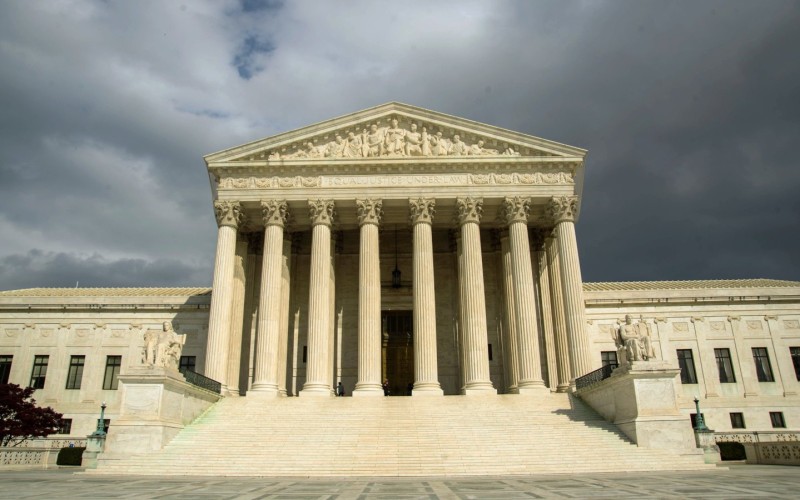U.S. District Court Judge Charles Breyer in San Francisco rejected both of Sheehan's claims and granted summary judgment to the city, but a 9th U.S. Circuit Court of Appeals panel reversed his ruling and ordered the lower court to try the suit.
That, in turn, led the city to appeal and to Monday's action by the U.S. Supreme Court. (Charles Breyer's involvement led Associate Justice Stephen Breyer to recuse himself from the Supreme Court's consideration of the case.)
The high court found that the police officers acted within the law and were entitled to "qualified immunity" from legal action.
Christine Van Aken, the deputy city attorney who argued the case before the high court in March, said Monday she was pleased with the outcome for Holder and Reynolds.
"The court's ruling makes it clear that the officers acted reasonably in doing their best to deal with a situation where they saw a lot of risk factors and did their best to resolve the situation right away," Van Aken told KQED's Peter Jon Shuler.
But the court declined to rule on the much broader issue that San Francisco had originally brought to the court: Whether the ADA's requirement for reasonable accommodations for those with disabilities applies to police officers facing violent situations.
In fact, both the majority opinion written by Associate Justice Samuel Alito and the dissent by Associate Justice Antonin Scalia criticized the city for failing to follow up that main argument -- "the only question for [the Supreme Court] to resolve is whether any accommodation of an armed and violent individual is reasonable or required" under the ADA -- after the high tribunal accepted the case.
Instead, the city argued in its briefs and at oral argument that the ADA's accommodation requirements didn't apply in Sheehan's case because her violent behavior disqualified her for such treatment.
Since the city didn't contest the ADA case on the grounds it had cited on appeal, the court majority dismissed that part of the city's case as "improvidently granted."
Scalia, joined in his minority opinion by Associate Justice Elena Kagan, was more blunt. He accused city attorneys of a "bait and switch" in its legal strategy:
Petitioners [San Francisco] faulted the Ninth Circuit for “holding that the ADA’s reasonable accommodation requirement applies to officers facing violent circumstances,” a conclusion that was “in direct conflict with the categorical prohibition on such claims adopted by the Fifth and Sixth Circuits.” Petitioners had expressly advocated for the Fifth and Sixth Circuits’ position in the Court of Appeals. ... “[T]he ADA does not apply to police officers’ responses to violent individuals who happen to be mentally ill, where officers have not yet brought the violent situation under control”). Imagine our surprise, then, when the petitioners’ principal brief, reply brief, and oral argument had nary a word to say about that subject.
Scalia, in fact, wrote that he wanted the court to dismiss San Francisco's entire appeal, because allowing even the portion concerning the individual police officers to stand amounted to rewarding the city for "snookering" the court.
The Supreme Court's ruling effectively reinstates the 9th Circuit's order for a trial on Sheehan's ADA claim against the city.
Sheehan attorney Ben Nisenbaum said he was pleased with the court's ruling because "it allows our client to have her day in court" and recover damages. Deputy City Attorney Van Aken said the city is prepared to defend the case.
What exactly is behind the city's switch in legal strategy -- which Scalia and other justices pointedly questioned during oral arguments two months ago?
Slate argues that the city's retreat from its original argument may have been by design and intended to support those who argue that police officers must accommodate the mentally ill in violent situations:
Anybody who cares about disability rights, then, should be grateful for San Francisco’s dodge. It may have been inglorious and, legally speaking, a little unseemly. But it reflected a pragmatism that has been conspicuously absent from recent progressive litigation. San Francisco’s city attorney won’t win many laurels for his last-minute evasion. But his maneuvering saved the rest of the country from a ruling that may have given cops free rein to treat mentally disabled people like typical violent offenders—and pull the trigger accordingly.
Of course, even experts are having a problem explaining how this case turned out.
Asked by Peter Jon Shuler whether the city had bungled the case, Stanford law Professor Robert Wiseberg said, "I can't tell whether it was bungled or just a change of mind, a chickening out of the ADA issue -- I just don't know."
